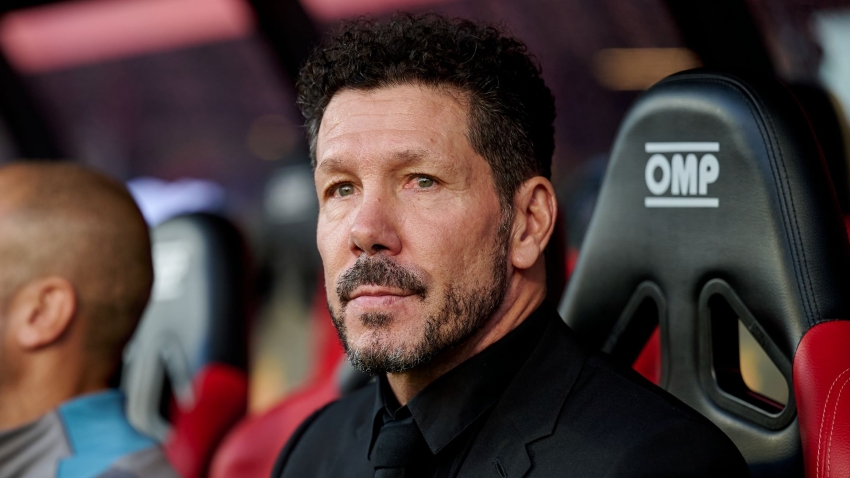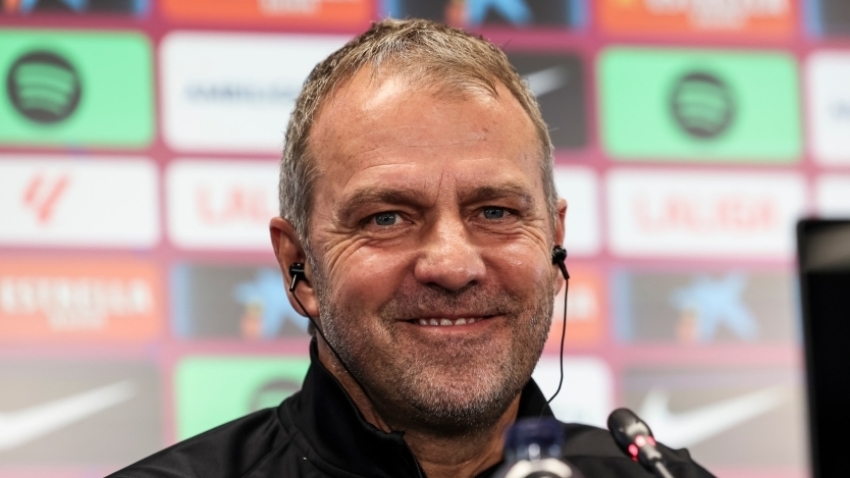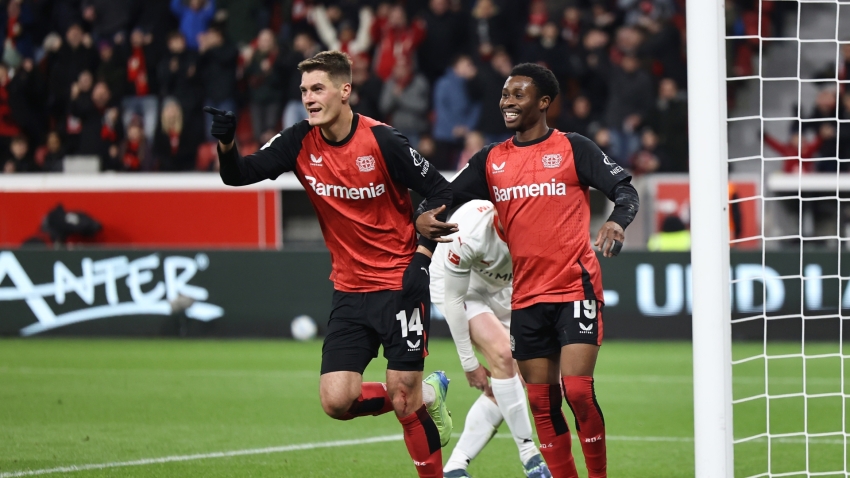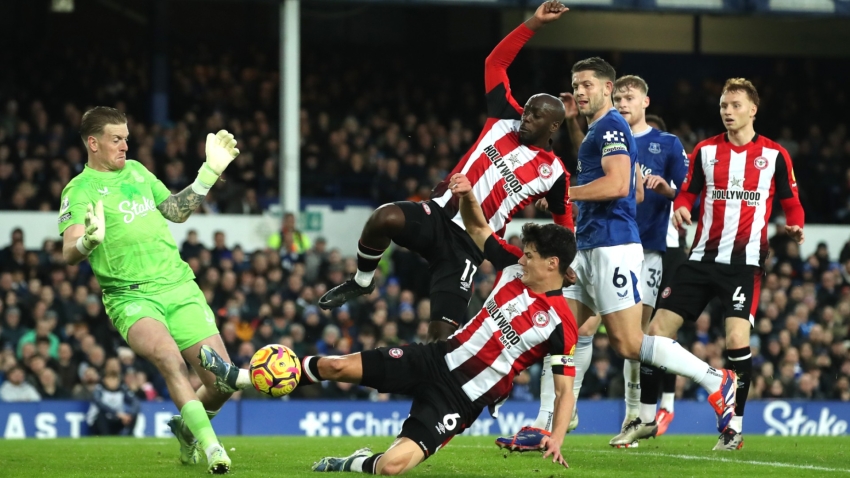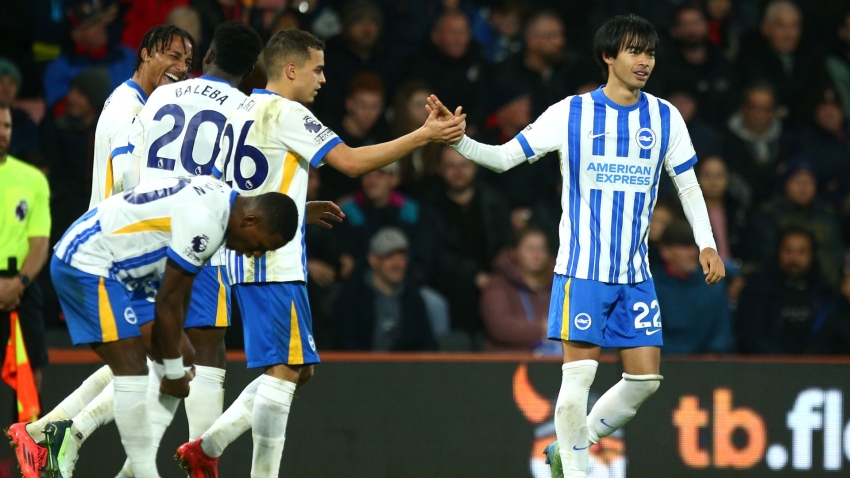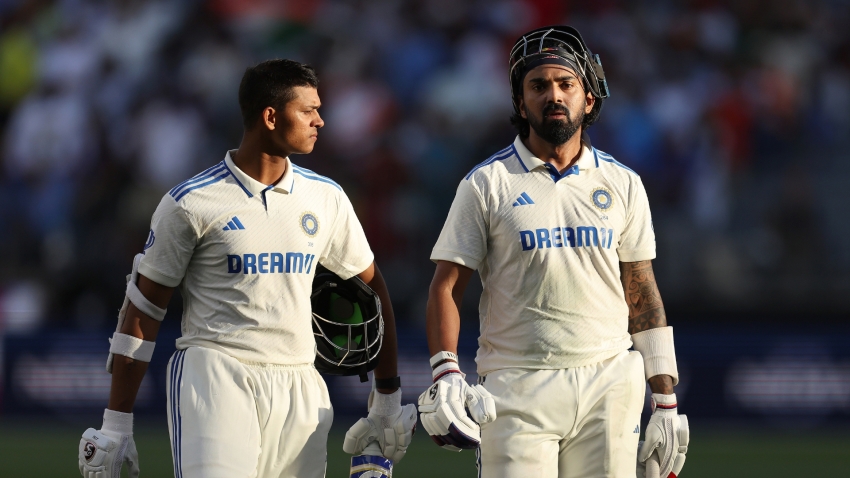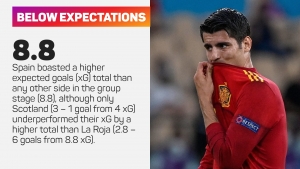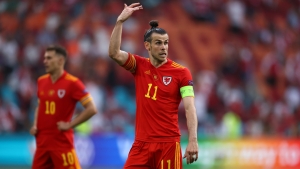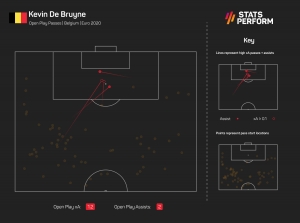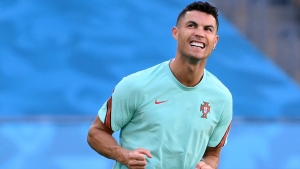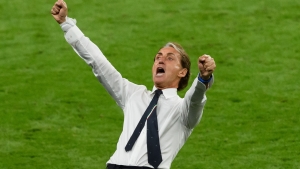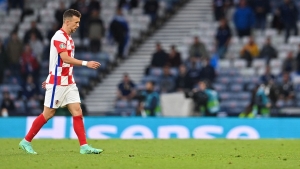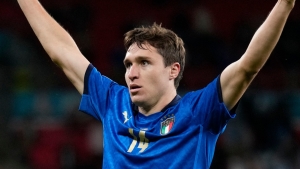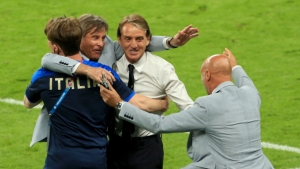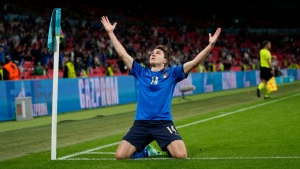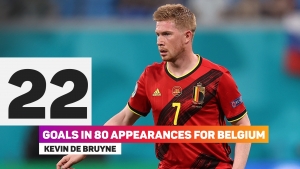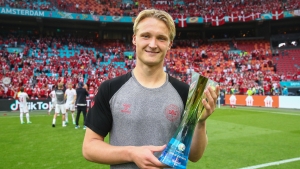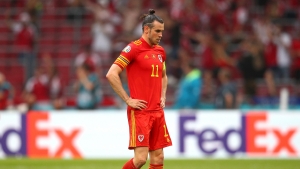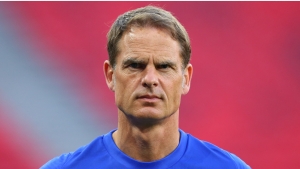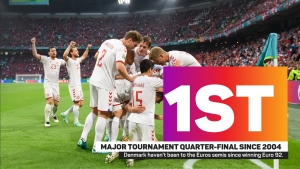Belgium face holders Portugal in a mouthwatering Euro 2020 last-16 tie on Sunday and their star attacking midfielder is in ominous form.
Kevin De Bruyne began the Red Devils' group campaign on the sidelines as he recovered from facial injuries sustained during Manchester City's Champions League final defeat to Chelsea.
“I don't feel anything on the left side, like after a visit to the dentist," he explained in a typically abrupt fashion.
But since being introduced as a half-time substitute with Belgium 1-0 down to Denmark in Copenhagen, the 29-year-old has unquestionably made his presence felt.
A brilliant assist and thumping winning goal saw the playmaker inspire a 2-1 win almost singlehandedly.
Belgium made it three wins from three thanks to a routine 2-0 triumph over Finland in their final Group B match, with De Bruyne laying on Romelu Lukaku's third goal of the tournament.
Despite only playing 134 minutes at Euro 2020, he has created five chances with an expected assists (xA) value of 1.18.
Bruno benched as holders struggle to find their feet
If this is a case of De Bruyne emphatically bringing his Premier League form onto the international stage, the same cannot yet be said of Bruno Fernandes.
Since his Manchester United debut on February 1 last year, Fernandes' 19 assists are the most supplied by any player in England's top fight. De Bruyne, with 17 assists having played 2,904 minutes to the Portugal international's 4,297, is the only other player to have recorded more than 15 over the same period.
The Manchester maestros also close out the top two in terms of chances created (De Bruyne 131, Fernandes 125), big chances created (De Bruyne 31, Fernandes 23) and chances created from open play (99 apiece) in this time.
Fernandes was in the starting line-up for Portugal's opener when they left it late to beat Hungary 3-0 in Group F, before being unable to avert a chastening 4-2 loss to Germany in Munich.
The former Sporting CP favourite was one of the victims as Fernando Santos shuffled his pack in response, only coming on as a late substitute in the 2-2 draw against France – his most notable contribution coming when he escaped punishment for an untidy challenge on Kingsley Coman in his own penalty area.
KDB running free
De Bruyne and Fernandes' contrasting contributions at Euro 2020 so far can by partly explained by the amount of freedom they are granted by their respective international bosses to recreate their club heroics.
"Kevin will have an influential role, the playmaker, linking possession," Martinez said a couple of days out from the showdown in Seville, with De Bruyne once again poised to leave a stamp on the game irrespective of starting position.
He replaced Dries Mertens against Denmark, nominally roving in the front three, before reverting to a central midfield position alongside Axel Witsel for a man-of-the-match showing versus Finland.
For City, the majority of De Bruyne's Premier League touches last season came in the middle third of the opposition half of the field, with 15.27 per cent in the middle of the left flank.
Within the far smaller sample size of his Belgium minutes at Euro 2020, the story is similar enough. Although he does not hit double-digit percentages across the middle attacking third as he does for City, 15.38 per cent of De Bruyne's Red Devils touches are in that favoured position - coming in from the left and able to see the full picture unfolding.
Fernandes' made 14.08 per cent of his United touches in the same area in 2020-21, with a comparable spread across the attacking midfield zones to De Bruyne.
By contrast, for Portugal at Euro 2020, there has been a huge concentration of Fernandes' touches on the right flank - 22.68 per on the right of the middle third of the opposition half, compared to just 4.12 per cent where he does the biggest chunk of his United work.
This suggests far less license to express himself than De Bruyne enjoys under Martinez and the on-field relationship each man has with their team's superstar goalscorer is somewhat wrapped up in all this.
KDB and Rom in sync, Bruno struggling to feed Ronaldo
The outcome of Sunday's match could have a huge bearing on the winner of the Golden Boot, although Cristiano Ronaldo's group-stage haul of five means he might have already done enough.
Lukaku is building on a fabulous couple of seasons at Inter and has three for Belgium so far, with the centre-forward seeming to come alive whenever De Bruyne is in close proximity.
A marginal offside call had already thwarted the De Bruyne-Lukaku link before Belgium's number seven and number nine combined to complete the scoring against Finland.
It is not a one-way relationship, either, with Lukaku holding up play expertly for De Bruyne to lay Thomas Meunier's equaliser on a plate in the Denmark match.
Of De Bruyne and Lukaku's seven combinations at Euro 2020 – when one of them has passed to the other – six have ended in the opposition penalty area, underling their considerable threat in tandem.
Fernandes and Ronaldo have passed to one another 15 times, but only two of these exchanges have ended in the area and neither yielded a goal.
Their combinations have also been uneven. Fernandes came on in the 72nd minute against France and he and Ronaldo each passed to the other once. They shared three in total despite being on the pitch for 89 minutes together versus Hungary.
Perhaps this speaks of the respective status of the two playmakers with their countries. Fernandes, 26, is in Ronaldo's shadow like the rest of his international team-mates, meaning the cajoling leader on show at Old Trafford is unlikely to be seen to the same extent. Much like his overall presence, his on-field contributions have shrunk.
De Bruyne is second to no one in the Belgium set-up, the shining light of a celebrated generation alongside Lukaku and Eden Hazard.
It means that, while they might compete as men of equal status in the next Manchester derby, De Bruyne will be the heartbeat of Belgium's bid for a quarter-final spot as Fernandes seeks to muscle in and make his own talents felt from the margins.







